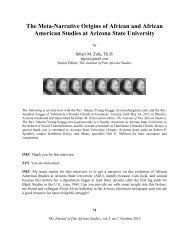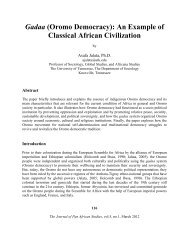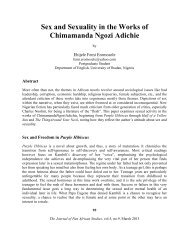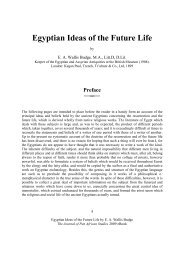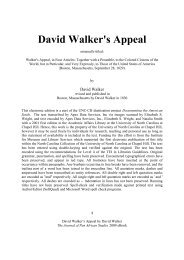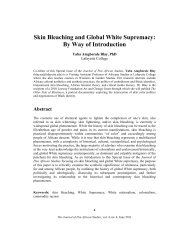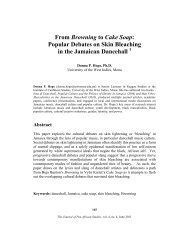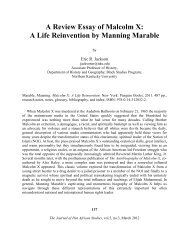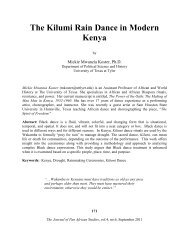Yabis - Journal of Pan African Studies
Yabis - Journal of Pan African Studies
Yabis - Journal of Pan African Studies
You also want an ePaper? Increase the reach of your titles
YUMPU automatically turns print PDFs into web optimized ePapers that Google loves.
4<br />
Henceforth, all his songs were written and rendered in Pidgin English, which he called<br />
“the language <strong>of</strong> the common man” (Olatunji, 2001:42).<br />
<strong>Yabis</strong> Music and Pidgin English Language – A Synergic Paradigm<br />
For any language to cut across and survive in a heterogeneous nation like Nigeria, it must<br />
have a propensity <strong>of</strong> being easily understood by both the educated populace and the<br />
illiterate members <strong>of</strong> the society. The only language that best qualifies for this purpose in<br />
Nigeria is Pidgin English. Pidgin has been defined by The Random House Dictionary <strong>of</strong><br />
the English Language (1987) as:<br />
…an auxiliary language that has come into existence through the<br />
attempts by the speakers <strong>of</strong> two different languages to communicate,<br />
and this is primarily a simplified form <strong>of</strong> one <strong>of</strong> the languages with a<br />
reduced vocabulary and grammatical structure and considerable variation<br />
in pronunciation.<br />
We have stated elsewhere that it is generally believed that the majority <strong>of</strong> people in the<br />
south-south geo-political region <strong>of</strong> Nigeria, the ghettos in Lagos (e.g. Maroko and<br />
Ajegunle), Warri and Port Harcourt have all contributed immensely towards the<br />
development <strong>of</strong> Pidgin English as a language in Nigeria (Olatunji, 2001:41). A replica <strong>of</strong><br />
this habitat <strong>of</strong> people is also found in other regions throughout the length and breadth <strong>of</strong><br />
Nigeria. These are the people that form the larger percentage <strong>of</strong> the Nigerian masses or<br />
commoners.<br />
This, perhaps, informed Fela’s decision to reach out to members <strong>of</strong> this population <strong>of</strong><br />
Nigerians for them to form the nucleus <strong>of</strong> his audience. He had a strong believe that for<br />
his new brand <strong>of</strong> music to be acceptable and fulfill its objectives, he had to “pitch his<br />
tent” with the oppressed and the underprivileged people in Nigeria. As a matter <strong>of</strong> fact,<br />
this community <strong>of</strong> people constituted a considerable population <strong>of</strong> those who were<br />
always at the receiving end <strong>of</strong> any bad governance and draconian laws <strong>of</strong> the military<br />
junta in Nigeria. Fela chose to write and render his songs in Pidgin English in order to<br />
communicate his ideals to this set <strong>of</strong> people; the people at the grassroots. This effort by<br />
Fela made his music become more acceptable by the masses and, eventually, by the<br />
children <strong>of</strong> the elite in Nigeria, who could not help but sing along with him at his<br />
concerts; in Pidgin English. So, unconsciously, pidgin crept in and maneuvered its way<br />
into the domains <strong>of</strong> the elite. Again quoting Mabinuori Idowu:<br />
29<br />
The <strong>Journal</strong> <strong>of</strong> <strong>Pan</strong> <strong>African</strong> <strong>Studies</strong>, vol.1, no.9, August 2007



